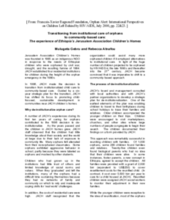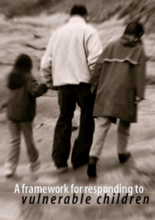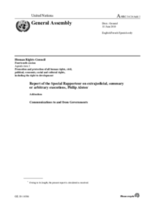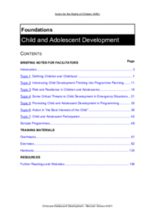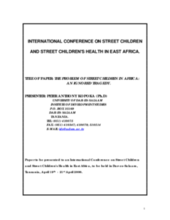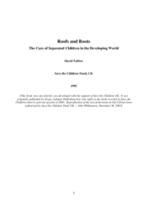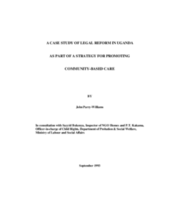Displaying 901 - 910 of 917
An account of Jerusalem Association Children’s Homes’ work involving deinstitutionalization of orphaned children in Ethiopia. The report is a summary of the steps taken by this organization to reunify/reintegrate the children into their families and society and some next steps are also mentioned.
Discusses the value of the UK Children in Need assessment framework for use by Victorian Family Services (Australia).
Country report of China on the situation of children in residential care in anticipation of the Second International Conference on Children and Residential Care: New Strategies for a New Millennium, to be held in Stockholm 12 – 15 May 2003.
The purpose of this report is to document the levels of child abandonment and de-institutionalization as an indicator of the quality of social transformation during the transition decade (1990-2000).
Resource pack for a course in child and adolescent development. Emphasis on identifying threats to childhood development and strategies to promote development in adverse conditions. Includes facilitators notes, participatory exercises, overheads, and handouts.
Examines initiatives taken to protect street children in Africa. Emphasis on increasing community and NGO participation in local responses.
A paper describing a study that reviewed the role of institutional care in Albania, Armenia, Latvia, Lithuiania and Romania, where the World Bank worked to develop community based care social services and move away from large residential institutions that according to the paper have deleterious affects on the nations and on the people who live in them. Particularly, the study focuses on the use of residential institutions by children, people with disabilities and the frail and isolated elderly.
A summary of Ugandan child care and protection policies that have sought to de-institutionalize care, provide family tracing and re-unification, and improve community care.
Save the Children’s research and analysis of residential care services and the need for alternative non-institutional approaches for children separated from their families. This book examines policy and practices from work in Africa, Asia, Latin America and the Caribbean, and Eastern and Central Europe.
This paper describes a case study examining the legal reforms made in Uganda in the area of community-based care.

